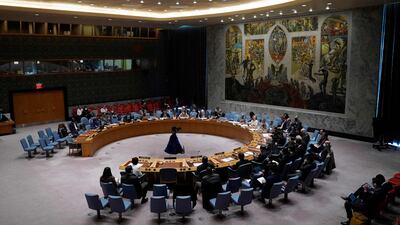Live updates: follow the latest news on Russia-Ukraine
In the early hours of February 24, Karim was woken by his father in the northern Jordanian city of Irbid to learn that Russia had invaded Ukraine.
Karim, whose father is Jordanian and mother is Ukrainian, was on a break from his first-year studies at Lutsk Technical University. He is now trying to travel back to Europe to join the effort to defend Ukraine.
“These are dark times. One day, one hour, changed everything,” he said. “I want to be part of the process. I am figuring out a way, like through Poland.”
“It is one thing is to message my friends on the internet and ask if they are safe and another thing is to help them.”
Helplessly witnessing destruction
Jordan joined 141 countries at the 193-member United Nations General Assembly on March 2 in a vote to condemn the invasion and call for a halt to hostilities.
Ties between the countries are forged by Jordanian students studying abroad and Ukraine's role as a major foodstuff exporter to the kingdom.
Since the end of February, Jordan has waived visa requirements for Ukrainians who have relatives there.
“If the same situation happens in Jordan I would come to help. It is about the memories and the friends,” Karim, who is 18, said.
“You would not like to see the place where you had so many cool memories get destroyed.”
His friends in Lutsk have been digging fortifications and “organising well”, he said.
“It is the hardest time in the history of Ukraine, and we discovered that we are brothers,” he said. “There is lot of work to do.”
He said one of his Russian friends wrote to him to say that he would prefer to join the effort to defend Ukraine rather than enlist in the Russian military.
“I feel really sorry for those Russians who do not want the war,” he said. “They are not many, but they are there.”
A family reunited
When the Russian attack started, Karim's mother, Tetyana Kulish, was in Lutsk with Karim's younger brother.
She was woken in the middle of the night by the sound of explosions in the distance.
As she sat in front of her computer, looking for news, Lutsk quickly became one of the first targets of Russian bombardment.
“I panicked. I packed quickly – money and documents – and took my son from his bed and ran,” Ms Kulish said.
She said she called her father and sister, who live next to the long-closed Lutsk airport, and they were unharmed.
“They did not want to leave. I decided I had to take my son,” she said.
Russia’s attack forced her and her youngest son, who is 6, on a journey of more than 3,000 kilometres, first by car through a war zone and then by plane.
They waited nine hours at the Polish border for their turn to cross. On the other side, a Polish family they did not know waited for them. Like thousands of others, the family gave shelter to fleeing Ukrainians before the journey to Warsaw.
“People in Poland were so helpful, you cannot imagine,” Ms Kulish said. “Every day, they became more organised with their assistance. People were helping with accommodation, food, clothes, and everything necessary.”
Jordanains return home
Days after they had fled Lutsk, Ms Kulish and her son flew from Warsaw to Jordan, her husband’s homeland, and on to Irbid. There, she was reunited with her husband and Karim.
Ms Kulish and her youngest son are two of the hundreds of people who fled Ukraine through Eastern Europe to Jordan.
Many of the 5,000 Jordanians in Ukraine when the war started – mostly in blue-collar jobs or studying – were among those returning home.
Ms Kulish said many of their fellow passengers on the plane from Warsaw to Amman were Jordanians, Syrians and other Arabs who had been living in Ukraine.
“I was listening to them. They were saying we also have problems and military conflict in our area but no one is supporting us,” said Ms Kulish, who speaks Arabic and worked as a language teacher of German and Ukrainian in Lutsk.
She said only one of her Arab students sent her a message asking about her since the Russian assault.
In Jordan, Ms Kulish and other Ukrainians have not had much sympathy and support, although she said she does not need help.
“I think a lot of people politically support Ukraine but they cannot show it because they [the government] are keeping neutral,” she said.
Ms Kulish said she supports Karim's decision to go back to Ukraine, adding that 50 members of her family have joined the Ukrainian Army since the war began.
She said her heart did not leave Ukraine and she firmly believes her compatriots “will never give up” because they tasted freedom after the collapse of the Soviet Union three decades ago.
“I feel sorry for the Russian people … You cannot imagine the smell of freedom.”









































































